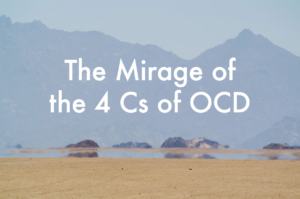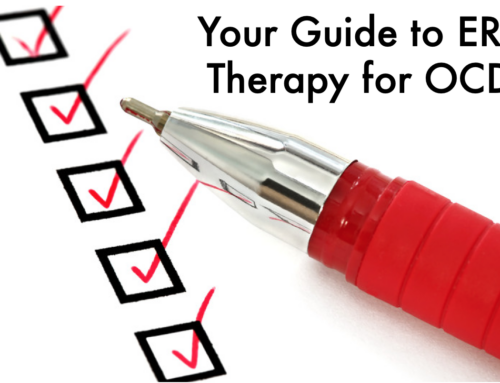It’s always wonderful when my OCD is wringing its hands about something when I’m writing blog posts, because it gives me something to work with. Today I woke up with both back pain (thanks to an over-energetic workout this weekend) and tummy troubles (thanks to who knows what?), and my OCD added these symptoms together and came up with—you guessed it—cancer.
OCD is nothing if not predictable.
My OCD has been worried about cancer ever since it determined that I had “head cancer” as a child, when I was suffering from unexplained hair loss:
…from the moment my mind locked on the idea that my hair loss meant head cancer, I had become the principal dancer in a doom-themed mental ballet that played on for months, with few, if any, intermissions. As my hair continued to disappear, I’d pull on my mental tights and toe shoes and spin pirouettes around the idea that I was dying. I felt pulled back and forth across my mind’s stage by my audience: hecklers outnumbering fans twenty to one, their shouts alternately filling me with hope and despair. Excerpt from Is Fred in the Refrigerator?: Taming OCD and Reclaiming My Life, p. 35.
But what my OCD was really concerned about then and what it’s really concerned about now is not cancer at all—it’s worried about the 3Cs, and then using a fourth C to try to address the other three.
Certainty
 OCD wants certainty that I don’t have cancer. It’s always wanted that. It wants to know for sure that every cell in my body is cancer-free. If I could live in a scanning machine that would continuously monitor my body, my OCD would be happy (until the continuous radiation from the machine really did give me cancer).
OCD wants certainty that I don’t have cancer. It’s always wanted that. It wants to know for sure that every cell in my body is cancer-free. If I could live in a scanning machine that would continuously monitor my body, my OCD would be happy (until the continuous radiation from the machine really did give me cancer).
But cancer is just OCD’s “content,” i.e. whatever it’s worried about. It could be about whether your sexuality is what you think it is or whether you offended someone or whether you’re in the right relationship or whether you hurt someone or whether you’re contaminated, etc. OCD would like 100% certainty that whatever it’s worried about is not true or not going to come true. But if it can’t get that, it will sometimes settle for the opposite: certainty that it is true or going to come true (i.e. as in the excerpt above: when I would “pull on my mental tights and toe shoes and spin pirouettes around the idea that I was dying”). OCD’s certainty that things are going to go wrong can often lead to what I call depression as a compulsion.
While OCD prefers certainty that everything will be okay, it will take certainty that everything isn’t going to be okay because all OCD wants is certainty: to “know” what’s going to happen (or so it thinks), which it’s hoping will provide the 2nd C, which is comfort.
Comfort
OCD loves a comfortable easy chair. A nice recliner that’s close the fridge and the air conditioning, so it can lie back and relax in comfort. But then OCD notices that little knot of fabric under its butt as it leans the recliner back, and it wiggles around trying to smooth out the knot so it can be comfortable again. Okay, knot gone, much better. But then OCD notices that the air is a little too cold, and it fiddles around trying to move the air flow off its face so that the temperature will be just right. Ahhhh perfect…..no…….wait. Now OCD feels hungry and has to get up to get a sandwich from the fridge so it can eat and be comfy again, but it opens the fridge to find it’s out of Dijon mustard, and it cannot enjoy a sandwich without Dijon mustard…..
You get my point here, right?
While OCD craves comfort, left untreated it is NEVER comfortable. Ever. Maybe for 1 nanosecond it might think it is, but it typically wastes that short span of time finding something else to worry about.
OCD’s on a constant search for things to feel and be just right. For there to be no anxiety. No stress. No worry. But it’s always looking for things it doesn’t like, that make it uncomfortable. Then it whines that it can’t handle that discomfort, that it’s supposed to be comfortable, and it would be comfortable if only we had a little bit of the 3rd C: control.
Control
OCD desperately wants control. Over everything if at all possible. It wants to micro-manage every aspect of life to ensure that things will be exactly how they are supposed to be. At. All. Times.
How does OCD try to get these 3Cs? With the final C, of course: compulsions.
Compulsions
 Compulsions temporarily reduce anxiety, and therefore they make OCD feel as if things are a little more certain, comfortable, and in control. For instance, in my situation, OCD would like for me to start making a lot of doctor appointments because it tells me that it needs the comforting and anxiety-reducing reassurance that I’m not on death’s doorstep. OCD tells me it would feel much more in control if I would “pull on my mental tights and toe shoes and spin pirouettes” around all the possibilities of what might be wrong with my health. Because at least then I’d be doing something to address it right now, which OCD tells me would make it feel a lot more comfortable.
Compulsions temporarily reduce anxiety, and therefore they make OCD feel as if things are a little more certain, comfortable, and in control. For instance, in my situation, OCD would like for me to start making a lot of doctor appointments because it tells me that it needs the comforting and anxiety-reducing reassurance that I’m not on death’s doorstep. OCD tells me it would feel much more in control if I would “pull on my mental tights and toe shoes and spin pirouettes” around all the possibilities of what might be wrong with my health. Because at least then I’d be doing something to address it right now, which OCD tells me would make it feel a lot more comfortable.
Ah, the lies that OCD tells.
OCD will swear that you’re doing compulsions to get particular outcomes or to prove something: that you didn’t offend someone or that you’re in the right relationship or that you’re not contaminated, etc… But that’s content. All of us with OCD do compulsions simply because they reduce anxiety to some degree and for some period of time (no matter how short), and as a result they make OCD feel things are a bit more certain, comfortable, and in control … which makes OCD beg us for even more compulsions.
You see where this is going: getting caught up in OCD’s 4Cs is like being in the desert and chasing the mirage of an oasis that’s not really there.
Seeing past the mirage of OCD’s 4Cs
What I am doing to not get sucked into OCD’s scary stories and the 4Cs? As I’ve written about in my post about health anxiety and OCD, I have rules for how I handle health symptoms, and I’m going to follow those, not the compulsions OCD wants me to do. But mostly I’m putting my Shoulders Back and doing my best to ignore OCD and all its whining.
Further, I remind myself of the following:
- There is no certainty. Uncertainty isn’t bad; it’s a neutral concept that means we don’t know. And as I wrote a few years ago in another post, uncertainty might upset OCD, but it is also the bedrock of hope.
- Re: comfort, I will quote Susan David, PhD: “Discomfort is the price of admission to a meaningful life.“
- Control is an illusion. We do what we can and hope for the best, but outcomes are often out of our control.
For me, the key to dispelling OCD’s mirage of the 4Cs has been doing exposure and response prevention therapy (ERP) and learning to accept (and even embrace!) uncertainty, discomfort, and lack of control. How might ERP help you do the same?
Learn more about taming OCD
To learn more about how I used ERP to escape OCD’s mirage, read or listen to Is Fred in the Refrigerator? Taming OCD and Reclaiming My Life, including Dr. Reid Wilson’s Afterword, where he offers powerful guidance for how you can apply my OCD-taming strategies in daily life. Click here to purchase a copy.
Sign up for my Shoulders Back! newsletter to receive OCD-taming tips & resources, including notifications of new blog posts, delivered every month to your inbox.
My blogs are not a replacement for therapy, and I encourage all readers who have obsessive compulsive disorder to find a competent ERP therapist. See the IOCDF treatment provider database for a provider near you. And never give up hope, because you can tame OCD and reclaim your life!
Photo credit © Can Stock Photo / loskutnikov (mirage) and mtkang (flaming C)







Wow Shala, your descriptions of how OCD gets you resonates totally with my own experiences. So thankful for this blog post (and your excellent book), exactly what I needed this day. Thanks for sharing from your own life, and for advocating for us in the OCD community. There is light and hope!
Agreed!!!!
Thank you. I needed this reminder today.
Me too:)
Thank you. 🙂
Shala, your posts are always comforting — It’s a reminder to me that OCD is REAL, it’s not me causing my oh so extremely devastating worries & irrational responses to them. AND most of all that there is effective & continuous treatment such as CBT & ERT. Shala, I’m so grateful for your posts🙏💕
I started ERP but I’m definitely not on board with accepting that there’s no certainty/control/comfort in life. I don’t need a meaningful life, I want an easy and comfortable life lol. Sounds awful but it’s just how I am, at least for now. At most, I’m open to the possibility that it’s possible to accept these things 🙃